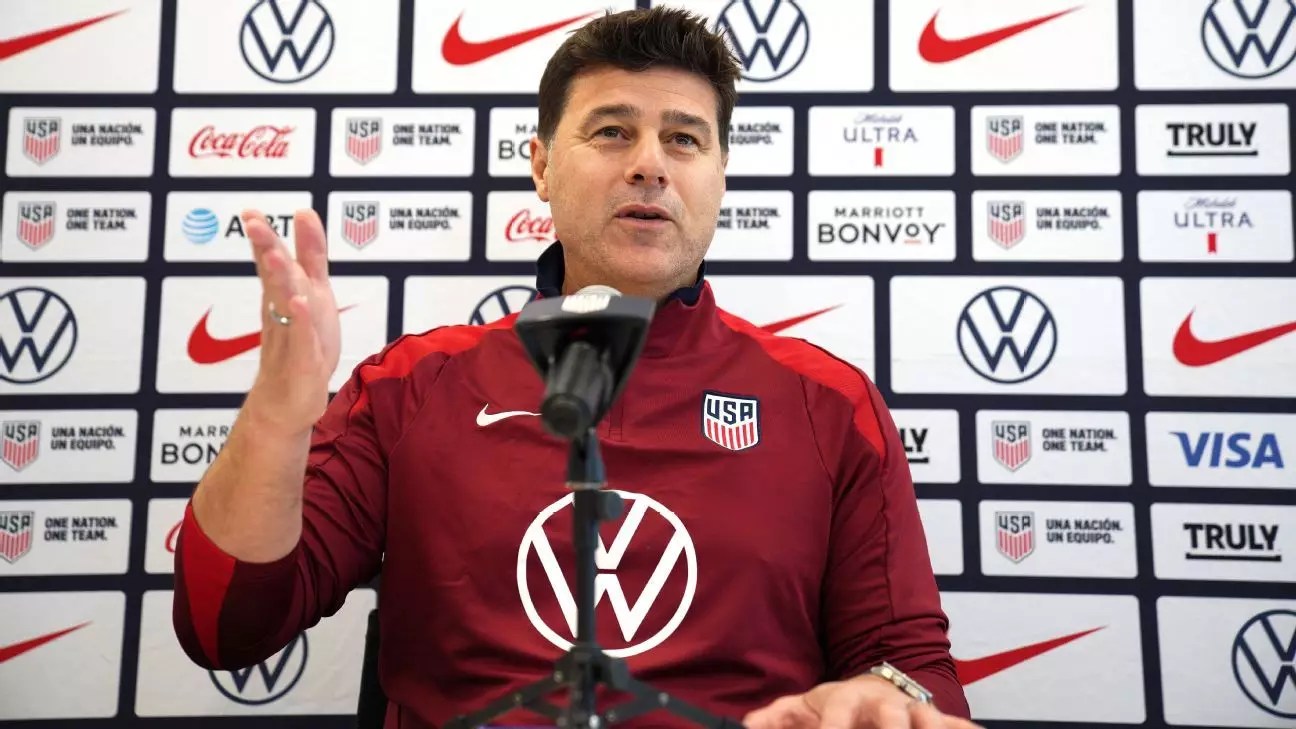In the realm of football, the pressure on players to deliver results consistently is immense, and few know this better than United States men’s national team head coach Mauricio Pochettino. He has recently spoken highly of Christian Pulisic, a player who has emerged as one of the most potent offensive threats in the game today. As the AC Milan star continues to excel, having netted six goals and provided two assists in the early part of the season, concerns regarding his workload have been raised. Pochettino’s acknowledgment of Pulisic’s talent is accompanied by an urgency to ensure that the player remains healthy and effective throughout the demanding season ahead.
The dual nature of Pochettino’s remarks reflects the delicate balance of professional sports: managing the physical toll on players while expecting peak performance. Pulisic’s prior struggles at Chelsea, where he faced challenges in securing regular playing time, have seemingly fueled his drive and hunger at Milan. The U.S. coach’s focus on protecting Pulisic serves as a reminder that even the most talented players are vulnerable to burnout, and maintaining their fitness is essential for long-term success.
Pulisic himself has openly discussed the roller coaster of emotions that accompanies a professional athlete’s career. He illustrates this concept well, noting how form can vary dramatically from one moment to the next. At one point, players may find that every opportunity seems to result in success, while in other phases, they struggle to make an impact regardless of effort. Pulisic’s current form is a testament to his resilience and hard work—a cumulative outcome of years spent honing his craft.
The offensive dynamo has embraced his successful run, attributing his recent achievements to both determination and mental fortitude. Pulisic’s ability to remain level-headed during peaks and valleys of form not only reflects his mental strength but also serves to inspire younger players who may face similar challenges. The importance of confidence for a forward cannot be understated, and Pulisic’s efforts demonstrate how crucial it is to stay grounded during times of success.
With the U.S. team’s recent restructurings, Pochettino is keenly aware that his managerial debut presents unique challenges and opportunities. The friendlies against Panama and Mexico provide a platform for him to establish his authority as head coach, but also to foster relationships within a diverse group of players and staff who are now working collaboratively for the first time.
Pochettino underscored the necessity of building rapport and familiarity among the staff and players, as a cohesive, well-organized unit is paramount to successful national representation. His approach illustrates the reality that grassroots camaraderie often translates to better on-field performance, and the early phase of camp is as much about bonding as it is about strategy.
As Pochettino prepares for the challenges that lie ahead, he remains open to flexible coaching tactics, a refreshing approach that distinguishes him from many others in the profession. His humorous take on the rigidity often associated with coaching philosophies highlights a significant stand against a one-size-fits-all approach. Pochettino is mindful that football is not merely a game of tactics and strategies; it is a dynamic environment that requires adaptability.
The coach’s emphasis on player comfort and maximizing their potential underscores an important aspect of effective leadership. Rather than rigidly adhering to his own philosophies, Pochettino has signaled his intent to shape his coaching based on the unique strengths and weaknesses of his players. This philosophy fosters an environment where players feel empowered to express themselves, thus facilitating both individual and collective growth.
The interplay of talent management, personal resilience, and adaptive coaching emerges as a central theme in understanding the current dynamics surrounding Christian Pulisic and the U.S. men’s national team under Mauricio Pochettino’s guidance. As they embark on a new chapter, the balance between achieving short-term successes in friendly matches and cultivating long-term player development will be essential.
Pochettino’s proactive approach in recognizing the need for player protection, his commitment to relationship-building within the squad, and his willingness to adapt his tactical approach provide a promising glimpse into the future. With a player of Pulisic’s caliber leading the charge, and a coach with Pochettino’s vision at the helm, the U.S. men’s national team stands at a pivotal point—poised to unlock its full potential in the world of football.


Leave a Reply